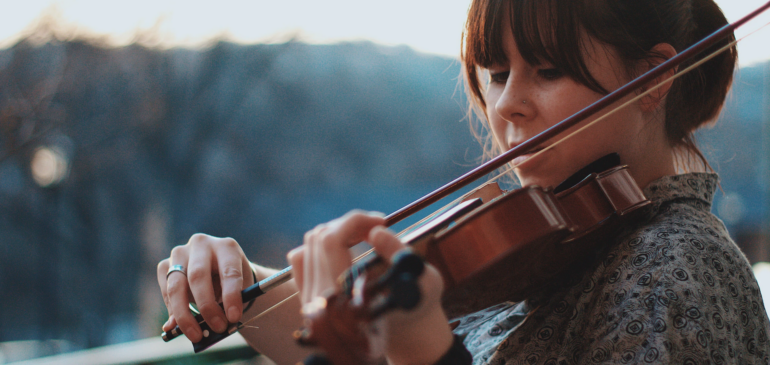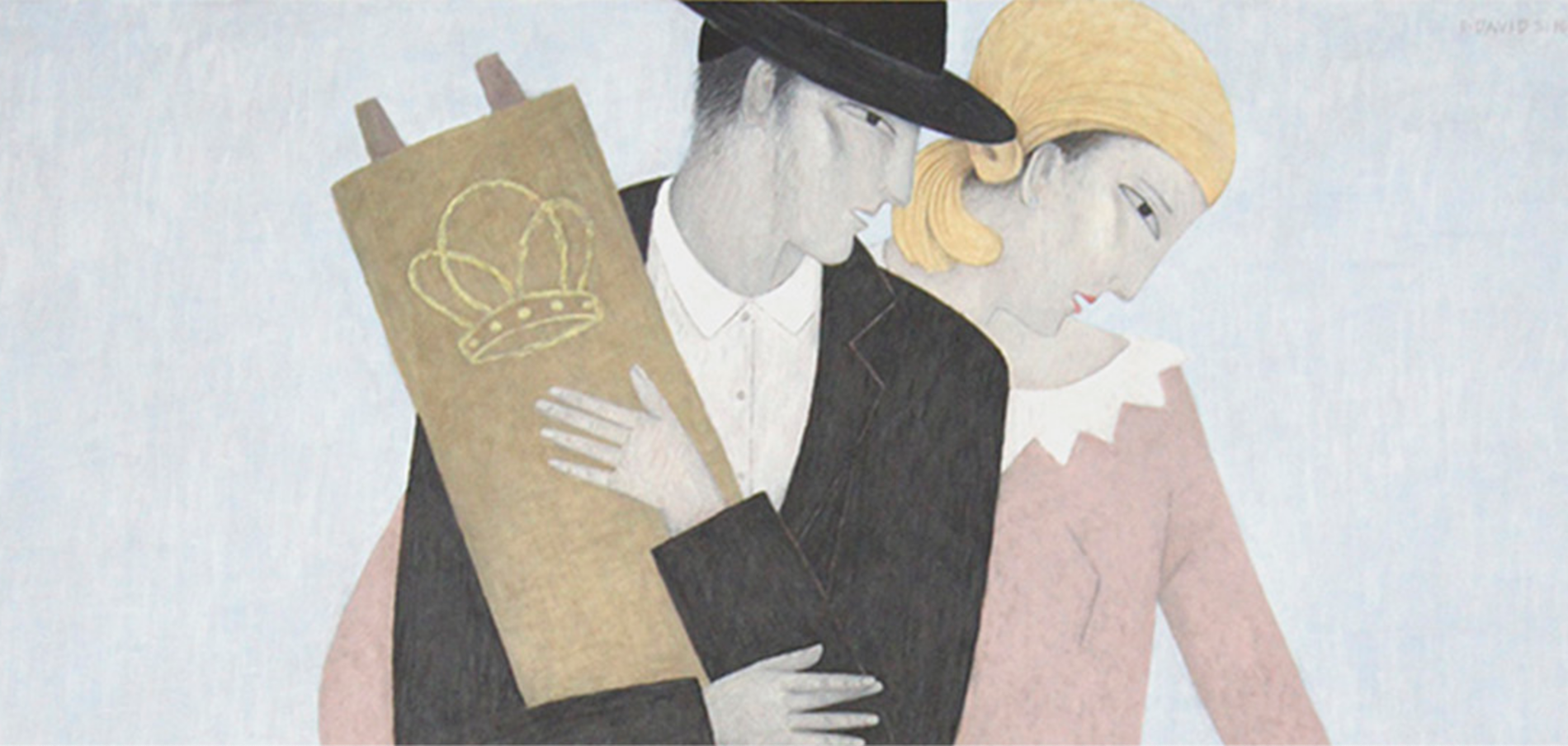
Are Orthodox Jewish Women Allowed to Play Instruments in Front of Men?
Dear JITC-
In Netflix’s “Unorthodox,” the husband, Yanky, makes a comment to his soon to be wife, Esty, indicating that a woman would never play an instrument in front of men. Are women allowed to play instruments in front of men according to Jewish law?
Thank you,
Shiri
Dear Shiri-
Thanks for your question. Women playing an instrument – in particular, the tambourine – has a lot of Biblical precedent. The most familiar no doubt occurs in Exodus 15:20, “Miriam, the prophetess, sister of Aaron, took a tambourine in her hand, and all the women came out after her with tambourines and lutes[1].” There are, however, other sources. These include:
- “Yiftach (Jephthah) came to Mitzpah, to his home, and behold, his daughter came out to greet him with tambourines and lutes” (Judges 11:34);
- “When they came, when David returned from slaying the Philistines, the women came out from all the cities of Israel, to sing with musical instruments, towards King Saul with tambourines, with joy and with cymbals” (I Samuel 18:6);
- “First come singers, then musicians, among maidens playing tambourines” (Psalms 68:26).
In the Midrash, we are told that Search the daughter of Asher gradually broke the news to Yaakov that Yoseif was still alive in Egypt. She did this by playing the harp or the lyre and gently singing the news to Yaakov (Sefer HaYashar on parshas Vayigash).
Now you might ask, is the fact that Yiftach’s daughter played for her father proof that women may play instruments generally in front of men? From the fact that the verse names two types of instrument, and each is in the plural, I can only assume that she was accompanied by friends.
But let’s discuss the main source text, that of Miriam in Exodus. According to the Yalkut Reuveini, the women played their instruments but they didn’t sing. The Meam Loez says that the women played instruments in order to drown out the sound of their voices. We see that the commentaries are concerned with the prohibition against kol isha – men listening to women singing. They are unconcerned with the fact that the women played instruments in front of the men.
Moving from Bible, Midrash and commentaries to the realm of practical halacha, the Aruch HaShulchan rules outright that it’s not a problem for men to hear women playing musical instruments. He writes, “It seems that the prohibition only applies when women sing, not when they play music on an instrument, since the issues of creating improper thoughts and exposing private areas are not relevant (to instruments)” (75:8).
All this seems to be a “slam dunk” in favor of permitting men to watch women play instruments. However, many may recall the infamous incident of the drumming bride.
In February 2019, Shira Hershkovitz, 19, went onstage and played the drums at her own wedding alongside the Yoeli Dickman Orchestra. When a video of the set when viral, complaints were lodged with the organization that provides kosher certification for the B’nei Brak venue where the wedding was held. They chastised both the hall and the band for permitting the spectacle.
So, if women playing instruments in front of men is permitted, why did they object to the drumming bride?
Because it’s not about the drumming per se.
If a woman sings in front of a man, it’s a halachic problem. But what if she’s behind a curtain? It’s still a problem because the source of the prohibition is the sound of her singing.
If a woman plays an instrument behind a curtain, the man can certainly listen. The sound isn’t the issue. It’s the sight that’s potentially problematic.
The Talmud in no uncertain term prohibits a man from walking behind a woman, even his own wife (Brachos 61a). This is because he invariably stares at her movements and it gives him sexual thoughts. [The status of this halacha today is not self-evident – see Leket Yosher (Rav Yoseif ben Moshe, 15th-century Bavaria) YD 376 in the name of the Terumas HaDeshen. So I’m not saying that a man shouldn’t hold the door for a woman or allow her to board a bus first; ask your own rabbi for guidance.]
From the aforementioned halacha about not walking behind a woman, the Radbaz (Rav David ibn Zimra, 16th-century Spain) rules that men may not watch women exercise their special talents – like drumming – because it causes them to stare at the women (2:770).
We see that people lack propriety even in the situations where one might least expect that to be the case. They had to designate a special women’s section in the Temple because of all the flirtatious behavior that was going on (Succah 51b). The great sages Abaye and Rava set up mechitzas at their Torah lectures (Kiddushin 81a). We see that Tanach discusses gender segregation both in times of celebration (Psalms 148:12 – see Aruch HaShulchan EH 22:3) and in times of mourning (Zechariah 12:12). So the basis for caution is well established.
But in practice? Different communities are going to have different standards. What flies in one place would be considered scandalous in another. What’s shunned in the latter (like a drumming bride) might seem oppressive in the former. It all depends on which authorities a community follows. Some communities will say, “Of course a man should let a woman board the bus first!” Other communities will say that they shouldn’t even be on the same bus. Each has upon whom to rely.
So can a man listen to a woman play an instrument? Absolutely. But can he watch her do so? That depends. What’s unremarkable in Teaneck or Tel Aviv may not be acceptable in Boro Park or B’nei Brak.
Sincerely,
Rabbi Jack Abramowitz
Educational Correspondent
Follow Ask Rabbi Jack on YouTube
——————————————-
[1] The word m’cholos, which I have translated as “lutes” is usually translated “dancing.” Metzudas Tziyun on Judges 11:34, however, says that it’s the name of a musical instrument, as does Rashi on Psalms 53:1.
If you found this content meaningful and want to help further our mission through our Keter, Makom, and Tikun branches, please consider becoming a Change Maker today.








2 comments
Sort by
“It seems that the prohibition only applies when women sing, not when they play music on an instrument, since the issues of creating improper thoughts and exposing private areas are not relevant (to instruments)” (75:8).
I’m really curious to know exactly which private areas a woman ‘exposes’ whilst singing, or do I have the context of your statement completely wrong?!
A voice is not a “private part” like on the body. But in the Talmud there’s an idea that a song sung in a sexual way could be arousing to a man. The way that I understand these laws is that Judaism understands men get aroused all the time from different sources that are not the man’s wife. But it puts up fences around certain behaviors so that as much as possible the wife will be the main source of arousal. That’s certainly speaks to a woman’s deepest desires.